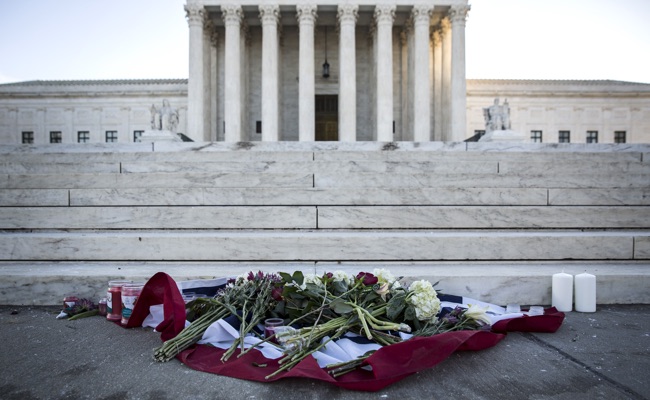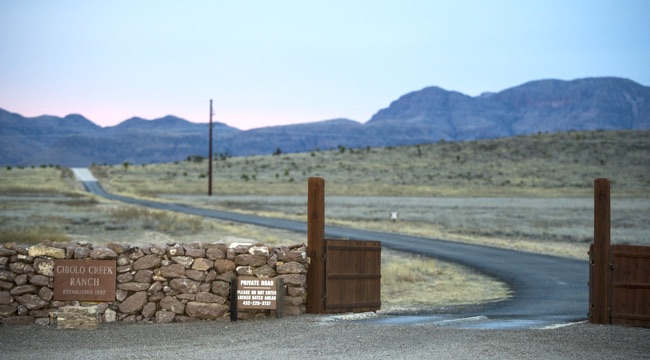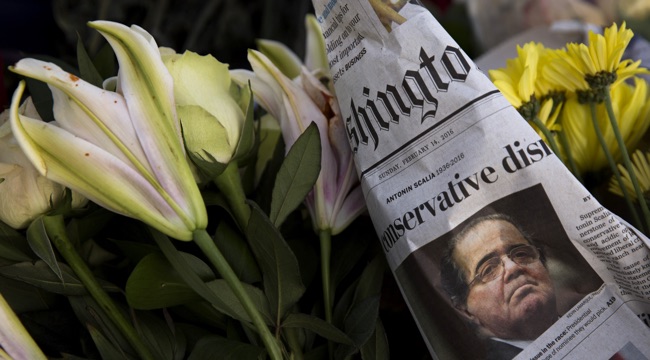
Three long days have passed since U.S. Supreme Court Justice Antonin Scalia passed away at the luxurious Cibolo Creek Ranch in Texas. After he failed to attend a breakfast, a staff member found his body in the resort’s expansive El Presidente suite. In the immediate aftermath, President Obama vowed to name Scalia’s replacement “in due time” while the talk show circuit filled itself with conservative lawmakers who argued otherwise. Likewise, the GOP presidential candidates kicked off their brawl-filled debate by arguing (along with Senate Majority Leader Mitch McConnell) that Scalia’s seat should stay open for a full year. The Senate could filibuster whoever Obama nominates, for the stakes are high with a lifetime appointee.
Scalia’s death falls right in the middle of a Supreme Court term. Several important cases — including what could be pivotal rulings on affirmative action, capital sentencing, and abortion rights (involving Texas abortion clinics) — remain on the docket. His absence could sway these decisions and, in come cases, allow appellate rulings to stand. This is the most immediate concern. Looking towards the future, anyone who replaces Scalia will help shape society for decades.
So, the GOP’s public maneuvering is simultaneously gutsy and ridiculous. They’re not trying to hide their bias, but the fact remains that — no matter what Mitch McConnell or Ted Cruz says — a year with a vacant seat would be unprecedented. Meanwhile, Senator Elizabeth Warren’s viral Facebook post rips the Senate Republicans and their “talk of loving the constitution.” These sides will fight regardless of what we say here about the staunch conservative justice. Likewise, the media scrutiny of Scalia’s death will remain as icky as one would expect. On Sunday, photo agencies swooped onto the ranch to capture exterior shots and a picture of the bed where Scalia passed.


And when people care too much, conspiracy theories happen. They happen when a great entertainer dies (Andy Kaufman, Jim Morrison, Elvis), but political figures are more complicated and don’t harbor universal adoration. With the death of such a politically inclined judge, it’s natural for his death to be politicized, too, by both sides. Scalia occupied the bench for three full decades. His quest for “originalism” leaves a huge conservative void. People feel very personally about the issues upon which Scalia ruled, so his death has produced “super” conspiracy theories that are off the hook.
This intensity also reflects how people remember Scalia. His politics offended many, but he stood as a mythical figure (albeit one who used absurd terms like “twistifications” and “jiggery pokery”) in the legal field. His professional foe, Ruth Bader Ginsburg, considered him her “best buddy” and credited him with helping her “nail all the weak spots — the ‘applesauce’ and ‘argle bargle’ — and gave me just what I needed to strengthen the majority opinion.” She valued how his dissents motivated her with “captivating brilliance and wit” and how majority-writing justices worked extra hard to overcome his points.
That’s how Scalia liked it. He stood as a counterpoint who often didn’t get his way, which was fine. Scalia was never too precious to hang on the losing side, just so long as he could fire off blistering dissents. He was highly influential — to both sides — while doing so. Outlets have complied summaries of Scalia’s most noteworthy screeds, and a few of them are instances where he wrote majority opinions. Many more are dissents, which Scalia thrived at writing. He’ll continue to be quoted by law reviews and appellate judges, which is exactly what he wanted. After all, Scalia once told the University of Chicago, “I write my dissents for casebooks. There’s no other reason to write them.”
In other words, Scalia carved out his own legacy by ensuring he’d influence generations of lawyers. There are tens of thousands of law grads in the U.S., and you probably know some closeted ones. All of them received the requisite Scalia rundowns during constitutional and criminal law courses. So, no matter how one feels about Scalia (and there are plenty of reasons to loathe his points), a begrudging respect develops for his arguments. This is a guy who invested years to carving out dissents that had no effect upon the cases at hand. Yet he mattered more than his critics would like to believe. And yes, the conspiracy theories are a result of this.
This could be the point of this essay where I accuse the internet of losing its mind. God only knows I’m not precious enough to avoid doing so. Yet a justice of Scalia’s tenure deserves more consideration, and the aftermath of Scalia’s death has provided some sketchy press reports. Conflicting reports about a possible autopsy were eventually kiboshed, for Scalia’s family “made it clear they did not want one.” Of course, the absence of an autopsy also dredges up the legal ruling by a Texas judge, who never saw Scalia’s body but still ruled in favor of “natural causes.”
Amidst the flurry of media coverage from larger outlets, an odd report from MySanAntonio.com painted a picture that fueled intense speculation. The ranch’s owner, John Poindexter, says the gathering was filled with his own friends. This was Scalia’s first visit to the ranch, and Poindexter personally invited the other three dozen guests. Scalia arrived as a friend-of-a-friend, and “there were no politics, no jurisprudence in the slightest.” This was simply a Supreme Court justice kicking it until a planned Wednesday departure:
“He was seated near me and I had a chance to observe him. He was very entertaining. But about 9 p.m. he said, ‘it’s been a long day and a long week, I want to get some sleep,” recalled Poindexter, who owns the 30,000-acre luxury ranch.
When Poindexter tried to awaken Scalia about 8:30 the next morning, the judge’s door was locked and he did not answer. Three hours later, Poindexter returned after an outing, with a friend of Scalia who had come from Washington with him. “We discovered the judge in bed, a pillow over his head. His bed clothes were unwrinkled. He was lying very restfully. It looked like he had not quite awakened from a nap.”
The “pillow over his head” detail seems to have pushed the conspiracy theorists over the edge. Never mind how a murderer would have, you know, likely disposed of the pillow instead of leaving a massive clue. Efforts to revive Scalia failed, so Poindexter phoned federal authorities, who “told me to secure the ranch.” Authorities arrived via helicopter on Sunday morning, and we’ve seen what happened next.
The resulting press coverage is voyeuristic, as are the reactions. Illuminati conspiracy theorists wonder whether Obama or “higher-ups” took out Scalia, “so the progressive liberals” would gain a shot at “pushing forward the New World Order and Cultural Marxist PC Social Justice Warrior agenda.” Folks have (satirically) blamed Leonard Nimoy. People have (not satirically) drawn inferences from how Obama’s climate change plan may benefit greatly from Scalia’s absence on the bench. Perhaps the oddest theory comes from Infowars‘ Alex Jones, who issued an “emergency transmission” about whether Scalia was murdered by Obama:
“‘Scalia found, it’s natural, nothing going on here, he just died naturally.’ before the body is even cold … And you’re like, ‘Whoa. Red flag.’ Then you realize, Obama is one vote away from being able to ban guns, open the borders and actually have the court engage in its agenda – and now Scalia dies. I mean, this is hard core. Are they going to kill Clarence Thomas? Maybe they’ll kill Donald Trump next. How many more of these are we going to sit here and put up with? Or maybe their airplane blows up. My gut tells me they killed him and all the intellectual evidence lays it out.”
One can’t rationally explain these conspiracy theories. To try and do so would be a fruitless endeavor, but Scalia meant a lot — good and bad — to a lot of people. Some of them need to cope by creating a fantastical tale to explain the mundane. After all, simply allowing Scalia’s story to end with him slipping away in his sleep seems anticlimactic. Folks like to think he went out in a more dramatic way, which would possibly befit a John Grisham novel. This is where the theories come into play. People want to believe such a fiery person went out as he lived, rather than that a man less than a month shy of his 80th birthday simply expired. These theories are a way of coping with the loss of an influential figure and one who will not be easily replaced.

(Via MySanAntonio.com, CNN & New York Times)
